The Batwa Cultural Trail takes you to visit the Batwa pygmies. The Batwa are believed to be one of the earliest ethnic groups to live in Uganda. They are known for their short stature and ancient practice of hunting and gathering. The Batwa lived in dense forests found around the great lakes region for thousands of years. The forests provided everything they needed. When hungry, they would simply go and hunt. When sick, they knew which plant to use as a remedy. The Batwa avoided frequent contact with tribes living outside the dense forests. They were feared and left alone because no one could defeat them in forest warfare. In the earlier years, they majorly lived in the Ituri forest of Democratic Republic of Congo but later migrated eastwards to Bwindi Impenetrable Forest, parts of the Mgahinga and Volcanoes and National Park. Some groups moved further and up to the Echuya Forest reserve in Uganda looking for better food and shelter.
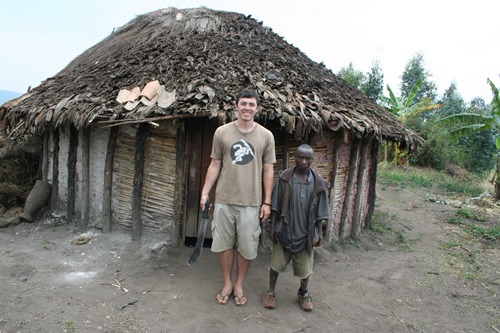 The Batwa lived a life of plenty and freedom with no idea that a day would come when they would have to leave the forest. Mgahinga and Bwindi impenetrable forest were turned into protected areas leading to the eviction of the Batwa in order to create room for gorilla conservation. The government thought that their continued stay in the forest encouraged poaching and deforestation from other tribes. The Batwa were resettled outside the parks and forced to live with tribes they had avoided for thousands of years. Because they looked different and had a completely different culture, the Batwa were marginalized. The Bakiga and other tribes viewed them as primitive people who were out to get their land.
The Batwa lived a life of plenty and freedom with no idea that a day would come when they would have to leave the forest. Mgahinga and Bwindi impenetrable forest were turned into protected areas leading to the eviction of the Batwa in order to create room for gorilla conservation. The government thought that their continued stay in the forest encouraged poaching and deforestation from other tribes. The Batwa were resettled outside the parks and forced to live with tribes they had avoided for thousands of years. Because they looked different and had a completely different culture, the Batwa were marginalized. The Bakiga and other tribes viewed them as primitive people who were out to get their land.
The government and other international organizations like USAID did what they could to ensure that the Batwa adjusted to life outside the forest. Whereas there have been many success stories, most people think the resettlement and rehabilitation process was not handled well. Some researchers point to the fact that despite government and other international organization projects designed to help the Batwa, they remain very poor compared to other tribes. Their standard of living is far below that of the average 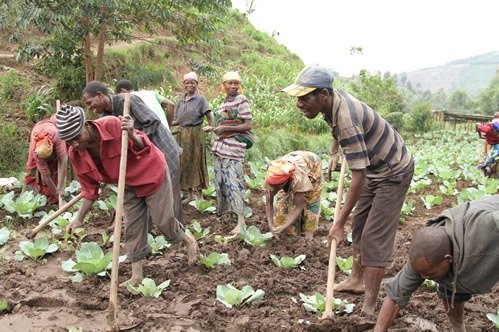 Ugandan. The Batwa have stuck to their ancient way of doing things. They still follow their ancient rituals, prefer staying in grass thatched huts and hunt illegally whenever they can. A few survive by cutting forest trees and turning it into charcoal for sale. As government becomes stricter on forest encroachment, most of the Batwa now have to live as squatters in farmlands owned by the Bakiga and other surrounding tribes. The Bakiga are a very hard working tribe who rely on farming and small businesses. The Batwa have failed to compete and most have resorted to drinking and reminiscing about the good old days when everything came on a silver plate. Living in destitution has forced many to resort to begging, stealing and prostitution just to have food on the table.
Ugandan. The Batwa have stuck to their ancient way of doing things. They still follow their ancient rituals, prefer staying in grass thatched huts and hunt illegally whenever they can. A few survive by cutting forest trees and turning it into charcoal for sale. As government becomes stricter on forest encroachment, most of the Batwa now have to live as squatters in farmlands owned by the Bakiga and other surrounding tribes. The Bakiga are a very hard working tribe who rely on farming and small businesses. The Batwa have failed to compete and most have resorted to drinking and reminiscing about the good old days when everything came on a silver plate. Living in destitution has forced many to resort to begging, stealing and prostitution just to have food on the table.
This article is not intended to demean the Batwa or blame the government. It is intended to show just how important it is to tread carefully when introducing new and modern ways of doing things to some communities that are stuck in their ways. For a similar example, you can refer to the Aboriginals in Australia or the tribes found in the Amazon. The Batwa are also a classic example of how wildlife conservation efforts can affect human communities negatively if not well planned. The government thought that by resettling them, they would quickly adapt a modern life like other tribes in Uganda.
Note: It is important to note that although the Batwa lost their original way of life, they still take so much pride in their traditional values and culture. Some have remained hunters, fruit gatherers and herbalists. A few have tried to adapt by embracing farming or bee keeping but at a small scale.
Who is helping the Batwa people?
The appalling condition of the Batwa people has not gone without notice. Several organizations and individual donors work with the government to help stop the poverty, primitive practices, 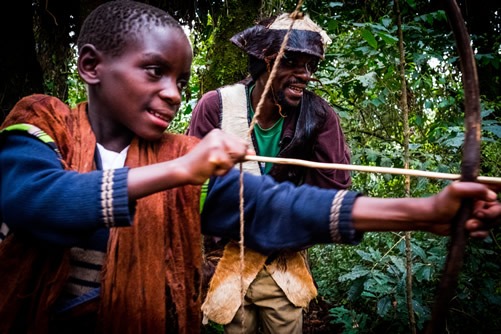 discrimination, marginalization, high mortality rate and possible extinction of Batwa pygmy communities. One of the challenges these organizations, individuals and projects had to deal with was the high mortality rate among the Batwa specifically due to both communicable and non-communicable diseases. These deaths were mainly because the Batwa were less immune to diseases found outside the forest. They also had no access to high quality clinics. Thousands died and there was a time when only 3,500 Batwa pigmies were recorded.
discrimination, marginalization, high mortality rate and possible extinction of Batwa pygmy communities. One of the challenges these organizations, individuals and projects had to deal with was the high mortality rate among the Batwa specifically due to both communicable and non-communicable diseases. These deaths were mainly because the Batwa were less immune to diseases found outside the forest. They also had no access to high quality clinics. Thousands died and there was a time when only 3,500 Batwa pigmies were recorded.
Which organizations are supporting the Batwa? Apart from the government through the Uganda wildlife authority, the Batwa have received help from The United States Agency for International Development 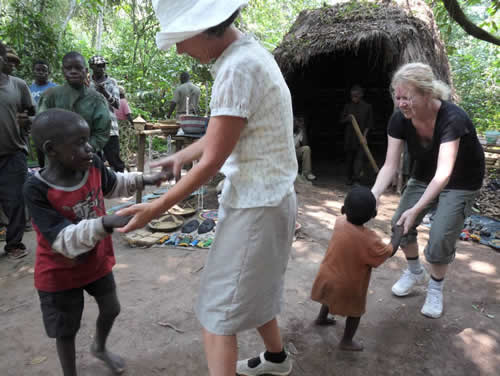 (USAID) and United Organization for Batwa Development in Uganda (UOBDU). Dr. Scot Kellerman and Carol Kellerman were however the first foreign humanitarians to raise funds for the Batwa people. They started out with some simple projects that focused on Water and Sanitation. The couple not only brought clean and safe water to the Batwa, but also helped raise awareness about their plight to influential donors abroad. With more funding, they built health centers, schools and other services. As a result, the conditions of living of the Batwa were greatly improved. More of their children went to school and some were employed to work in the facilities.
(USAID) and United Organization for Batwa Development in Uganda (UOBDU). Dr. Scot Kellerman and Carol Kellerman were however the first foreign humanitarians to raise funds for the Batwa people. They started out with some simple projects that focused on Water and Sanitation. The couple not only brought clean and safe water to the Batwa, but also helped raise awareness about their plight to influential donors abroad. With more funding, they built health centers, schools and other services. As a result, the conditions of living of the Batwa were greatly improved. More of their children went to school and some were employed to work in the facilities.
The Batwa Cultural Experience in Bwindi Vs the Batwa Trail in Mgahinga
In order to help the Batwa gain from tourism and attract more funding, the Batwa Cultural Experience was introduced by the Uganda Wildlife Authority and United Organization for Batwa Development in 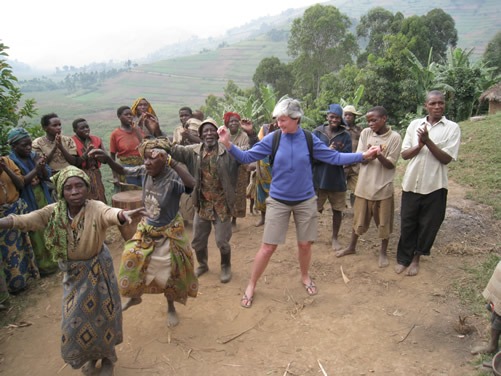 Uganda (UOBDU) with support from USAID. The Uganda Wildlife Authority is the governmental Agency responsible for managing all of Uganda’s national parks. The Batwa trail experience in Mgahinga and the Batwa cultural experience in Bwindi gradually became a major tourism product which is included on gorilla trekking packages. The Batwa Cultural Experience in Bwindi involves visiting communities of Batwa living on the edges of Bwindi Impenetrable forest. This activity is often undertaken after gorilla trekking in Bwindi forest. During Batwa Cultural Experience in Bwindi, the pygmies showcase all important aspects of their culture to tourists through dance, drama and storytelling.
Uganda (UOBDU) with support from USAID. The Uganda Wildlife Authority is the governmental Agency responsible for managing all of Uganda’s national parks. The Batwa trail experience in Mgahinga and the Batwa cultural experience in Bwindi gradually became a major tourism product which is included on gorilla trekking packages. The Batwa Cultural Experience in Bwindi involves visiting communities of Batwa living on the edges of Bwindi Impenetrable forest. This activity is often undertaken after gorilla trekking in Bwindi forest. During Batwa Cultural Experience in Bwindi, the pygmies showcase all important aspects of their culture to tourists through dance, drama and storytelling.
A longer and more exciting experience is the Batwa Trail in Mgahinga. Here things are done differently. The purpose is to ensure that tourists get a more practical understanding of the history and kind of life 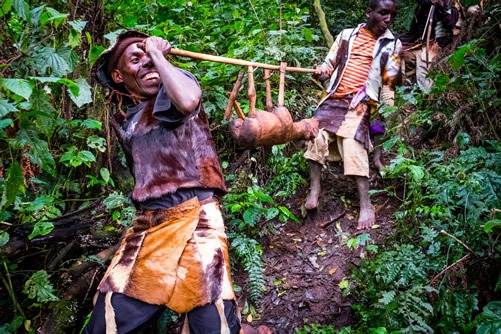 lived by the Batwa pygmies. The activity is led by the Batwa themselves and right in the forest. A group of Batwa Guides go with tourists deep into the forest to unlock their ancient hideouts, caves and hunting grounds. Tourists are more involved here and will be involved in hunting, gathering fruits, making fire and identifying herbs to treat common ailments. The activity ends at the Garamba caves. This mystical cave was very important in the history of the Batwa people. It was being their king lived and presided over major meetings. The Garamba caves was also were food was stored and a hiding place in case they were attacked by enemies. After visiting the forest with the Batwa, tourists are led back to Batwa homesteads for cultural entertainment (Dance, drama and storytelling). The Batwa Trail takes about 5 hours. All proceeds and funds collected from tourists are invested in Batwa community development projects.
lived by the Batwa pygmies. The activity is led by the Batwa themselves and right in the forest. A group of Batwa Guides go with tourists deep into the forest to unlock their ancient hideouts, caves and hunting grounds. Tourists are more involved here and will be involved in hunting, gathering fruits, making fire and identifying herbs to treat common ailments. The activity ends at the Garamba caves. This mystical cave was very important in the history of the Batwa people. It was being their king lived and presided over major meetings. The Garamba caves was also were food was stored and a hiding place in case they were attacked by enemies. After visiting the forest with the Batwa, tourists are led back to Batwa homesteads for cultural entertainment (Dance, drama and storytelling). The Batwa Trail takes about 5 hours. All proceeds and funds collected from tourists are invested in Batwa community development projects.
Additional information about the Batwa trail in Mgahinga National Park
What is the cost of the Batwa trail in Mgahinga? The Batwa Trail costs $80 per person but a discount of 10% is offered when traveling in a group. A fee of $400 is charged for tourists interested in making a film or documentary about the Batwa. All proceeds go towards enhancing the capacity of the Batwa to rely on themselves.
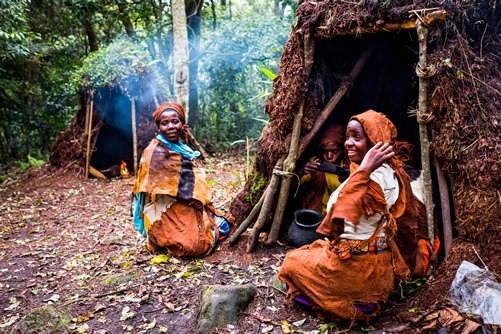 How challenging is the Batwa trail experience? The Batwa trail experience is not difficult to complete and any reasonably fit person can register for it. Although the trails are well designed and easy to complete, a tourist must be mentally ready to complete hiking through dense jungle. Mgahinga is a mountainous area (high altitude) and the weather is unpredictable. If you are planning to do the activity, we highly recommend that you do some long distance walking before showing up. It is also important to hire a porter in case you have a heavy backpack or cameras. Porters go for between $10 to $15. This is another opportunity to give back and employ the Batwa pygmies.
How challenging is the Batwa trail experience? The Batwa trail experience is not difficult to complete and any reasonably fit person can register for it. Although the trails are well designed and easy to complete, a tourist must be mentally ready to complete hiking through dense jungle. Mgahinga is a mountainous area (high altitude) and the weather is unpredictable. If you are planning to do the activity, we highly recommend that you do some long distance walking before showing up. It is also important to hire a porter in case you have a heavy backpack or cameras. Porters go for between $10 to $15. This is another opportunity to give back and employ the Batwa pygmies.
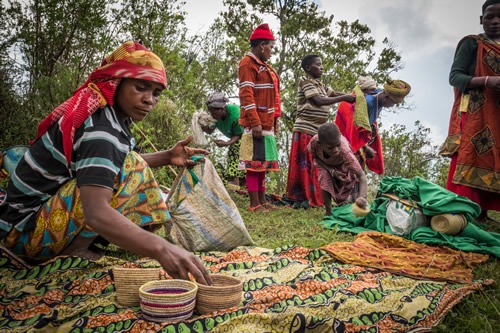 What do you need to carry for the Batwa Trail? The Batwa trail experience is more or less like a long nature walk in a forest. All the standard tools for a nature walk are required. By that we mean a binocular, camera, cap/hut, an insect repellent, a walking stick, snacks, energy drinks, drinking water and sun glasses. One must wear good hiking boots, a long sleeved top and a trouser.
What do you need to carry for the Batwa Trail? The Batwa trail experience is more or less like a long nature walk in a forest. All the standard tools for a nature walk are required. By that we mean a binocular, camera, cap/hut, an insect repellent, a walking stick, snacks, energy drinks, drinking water and sun glasses. One must wear good hiking boots, a long sleeved top and a trouser.
Note: The Batwa cultural experience in Bwindi and Mgahinga may be different in the way they are organized but one thing remains clear. They were started to promote Eco-tourism and to enable the marginalized Batwa pygmies benefit from tourism after being expelled from the two forests. Almost all tour operators include the Batwa cultural experience in their tour packages. Our 3 days Gorilla Tour in Bwindi package includes the Batwa cultural visit while the 3 Days gorilla trekking safari in Mgahinga can be tailored to include time with the Batwa pygmies.


